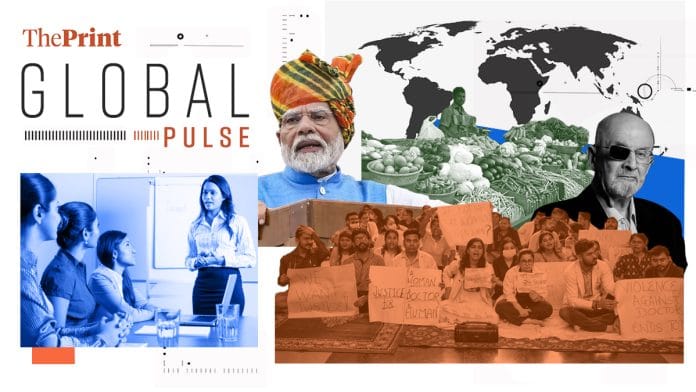New Delhi: India’s rise as an economic power has caught the world’s attention. Global publications have been regularly tracking the growth trajectory and discussing the policy changes that the country’s government can make in order to reach its economic targets.
Reflecting on Prime Minister Narendra Modi’s Independence Day speech and the general election result that “humbled” him, Financial Times writes about how India can create more jobs. The piece says that to fulfil the PM’s target of becoming a ‘completely developed nation’ by 2047, India must “capitalise on its labour force”, which is “one of the youngest and the largest in the world”.
FT suggests that greater focus must be on generating high-skill, high-pay opportunities, besides investing in education and bringing more women into the formal workforce.
With efforts to attract investment in the manufacturing sector through the ‘China Plus One’ strategy and producing the “largest numbers of graduates in Stem”, FT notes that “India has the potential to become the world’s research hub”. Calling for India to ride the wave of “global trends” once again like it did in the 1990s, the piece highlights that having poor wages for several Indians in the informal sector and jobless graduates is a “major problem for the BJP”, and an “enormous waste of talent for India, and the world”.
Mihir Sharma, a Bloomberg columnist, argues that India’s economic policies, particularly regarding food pricing in monetary targets, are outdated and need restructuring. He writes that the country’s agricultural subsidies, established in the 1960s, are no longer suitable.
Sharma suggests that ‘India Should Remove Food From Its Inflation Target’ as the central bank’s current mandate, based on outdated data, forces it to keep interest rates higher. He advocates for updating the consumer price index (CPI) to better reflect modern consumption patterns, similar to how Indonesia lays less emphasis on its volatile food prices.
A burning issue that has caught the eye of global media is the Kolkata rape-murder case. As doctors, women and other protests take to the streets, the West is watching.
The Washington Post’s Adela Suliman and The Globe and Mail’s Neha Bhatt write about the “widespread outrage” and the Indian Medical Association’s 24-hour national strike against the “inadequate handling of the case” and violence against doctors.
While Bhatt notes that trainee doctors in India are “vulnerable to stress and violence”, Suliman highlights that “gender-based violence remains a serious problem” in the country. Quoting protestors, both correspondents write about the gravity of the crime and the anger it has caused among Indians.
Reviewing Salman Rushdie’s memoir ‘Knife’, writer Salil Tripathi takes readers through the author’s life that has been spent “challenging those with power — politicians or religious leaders”.
Writing for Foreign Policy, Tripathi notes, “Rushdie has spent his life rebelling against the idea that people can be killed for their thought”. He has had a fatwa issued against him, along with “undisclosed attempts on his life”. Losing his eye altered his life forever.
In the piece, ‘Salman Rushdie’s Next Act’, Tripathi calls the memoir “hauntingly engrossing, sobering, and ultimately life-affirming”, and his wife, Rachel Eliza Griffiths, “the real hero” for helping him recover.
Ukraine destroys Russian bridge, election ‘fraud’ protests continue in Venezuela
Ukraine claims it has destroyed a second strategic bridge as the country’s troops continue their incursion into Russia’s Kursk region. To know more, read BBC’s report.
Protests against last month’s election results continue in Venezuela’s Caracas. Opposition leader María Corina Machado comes out of hiding to join supporters on the streets. To know more, read DW’s report.
(Edited by Mannat Chugh)






